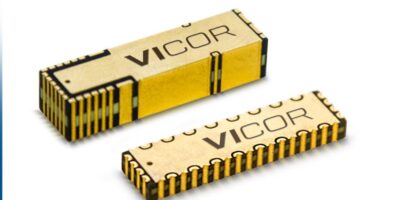Vicor’s Power-on-Package multipliers boost performance for AI processors
At the recent Open Data Center Committee (ODCC) Summit in Beijin, China, Vicor introduced Power-on-Package modular current multipliers. They are designed for high perfoamnce, high current CPU, CPU, ASIC, or XPU, processors. The industry faces the challenge of these XPUs’ operating currents now being measured in hundreds of Amperes, due to the increasing demands of high performance applications such as artificial intelligence (AI), machine learning and big data mining.
By freeing up XPU socket pins and eliminating losses associated with delivery of current from the motherboard to the XPU, Vicor’s Power-on-Package multipliers enable higher current delivery for maximum XPU performance, says the company.
Point of load (PoL) power architectures in which high current power delivery units are placed close to the XPU mitigate power distribution losses on the motherboard, explains Vicor, but do nothing to lessen interconnect challenges between the XPU and the motherboard. With the ever-increasing XPU currents, the remaining short distance to the XPU, called the “last inch” and consisting of motherboard conductors and interconnects within the XPU socket, has become a limiting factor in XPU performance and system efficiency.
Vicor’s Power-on-Package modular current multipliers (MCMs) fit within the XPU package to expand the efficiency, density, and bandwidth advantages of Vicor’s Factorized Power Architecture. This architecture is already established in 48V direct-to-XPU motherboard applications by early adopters. As current multipliers, MCMs mounted on the XPU substrate under the XPU package lid, or outside it, are driven at a fraction (e.g. 1/64th) of the XPU current from an external modular current driver (MCD). The MCD, located on the motherboard, drives MCMs and accurately regulates the XPU voltage with high bandwidth and low noise. Vicor’s Power-on-Package consists of two MCMs and one MCD, and enables delivery of up to 320A of continuous current to the XPU, with peak current capability of 640A.
With MCMs mounted directly to the XPU substrate, the XPU current delivered by the MCMs does not traverse the XPU socket, explains Vicor. As the MCD drives the MCMs at a low current, power from the MCD can be efficiently routed to the MCMs reducing interconnect losses by 10x even though 90 per cent of the XPU pins typically required for power delivery are reclaimed for expanded I/O functionality. Additional benefits, points out Vicor, include a simplified motherboard design and a substantial reduction in the minimum bypass capacitance required to keep the XPU within its voltage limits.
Two Power-on-Package devices are being introduced initially. They are a MCM3208S59Z01A6C00 MCM and a MCD3509S60E59D0C01 MCD. Multiple MCMs may be operated in parallel for increased current capability. The small (32.0 x 8.0 x 2.75mm) package and low noise characteristics of the MCM make it suitable for co-packaging with noise-sensitive, high performance ASICs, GPUs and CPUs, advises Vicor. Operating temperature range is -40 to +125 degree C. They are, says Vicor, the first in a portfolio of Power-on-Package options, scalable to various XPU needs.
Over the past decade, Vicor has pioneered 48V direct-to-XPU power development, reducing losses by an average of 25 per cent every two years, while increasing power system density and cost-effectiveness. The introduction of this MCM-MCD ChiP-set continues that evolution, says Vicor. By overcoming the obstacles imposed on XPUs by external high current delivery through the “last inch”, Vicor’s Power-on-Package technology improves performance and simplifies motherboard design and also enables XPUs to achieve previously unattainable performance levels that are necessary to fulfilling the promise of AI.




